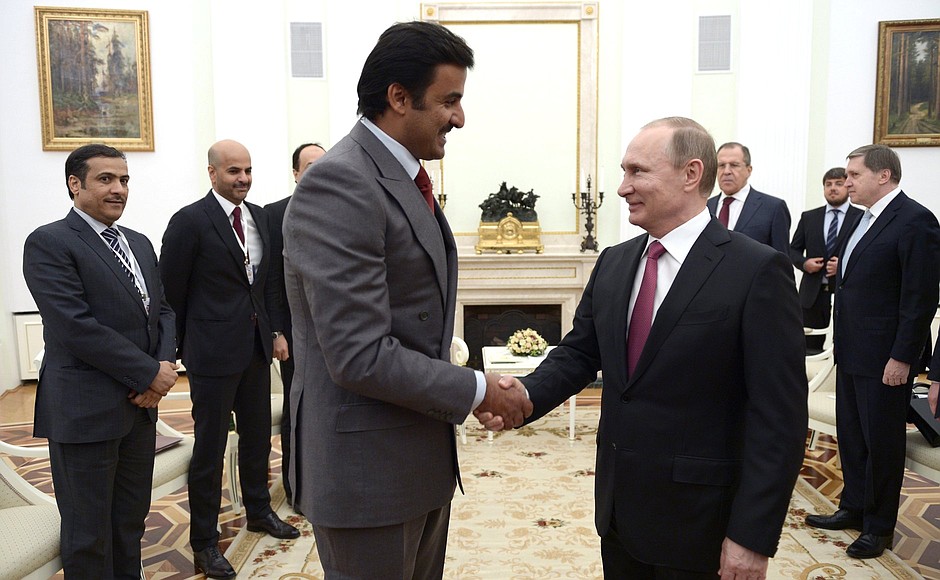by Mark N. Katz
According to some U.S. government officials, Russia has played a key role in the recent breakdown of relations between Qatar on the one hand and Saudi Arabia, the UAE, Egypt, and their dependents (such as Bahrain, the Hadi government in Yemen, and General Haftar in eastern Libya) on the other. Although the others have had policy differences with Qatar for many years, the recent crisis leading them to break diplomatic relations with Doha was precipitated by a Qatar News Agency story quoting the country’s emir, Tamim bin Hamad al-Thani, being critical of Saudi Arabia and friendly toward Iran. The Qatari government, though, has claimed that he never made those comments and it was a fake news story. CNN subsequently quoted unnamed U.S. government investigators who have concluded that Russian hackers planted the story that triggered the crisis.
President Putin’s spokesman, Dmitry Peskov, has vociferously denied this accusation. Another Kremlin advisor said that there was “zero evidence” for it. This, of course, is not quite the same thing as saying that Russia did not actually do it. Russian denials, though, are not exactly credible since Putin first denied sending Russian forces into Crimea but then admitted it, and more recently has denied Russian involvement in hacking activities that revealed information damaging to Hillary Clinton’s presidential campaign but more recently conceded that “patriotic Russian hackers” may have done so. It would hardly be a surprise, then, if a few months from now Moscow stops denying and either admits or allows for the possibility that some Russians (“patriotic” or otherwise) may have been involved in this episode.
If indeed Moscow were involved, why would it do such a thing? Some have suggested that it might simply seek to benefit from divisions between longtime U.S. allies. A call by Putin to the Qatari emir appealing for the crisis to be solved by “dialogue” and discussing Russian-Qatari economic, trade, and investment cooperation suggests that this is a possibility. President Trump’s initial support for actions against Qatar by Saudi Arabia, the UAE, and others certainly gave Putin an opportunity to get closer to the suddenly isolated emirate.
Still, if Moscow really did hack the Qatari news site, Putin’s reaching out to the Qatari emir does not quite fit the pattern of Russian behavior when it has previously denied American allegations of hostile behavior. Although Putin at first denied sending Russian troops into Ukraine and later denied Russian hacking of the Clinton campaign, there is no doubt that Putin saw both Ukraine and Clinton as opponents and wanted to see them weakened. If Russia did hack the Qatari news site but denied it, Putin’s past behavior would suggest he did so because he saw Qatar as an opponent and thus would not have seen this as the time to improve relations with Doha.
Putin, of course, is not bound by past behavior but can alter it to fit Moscow’s interests. What exactly, though, are Moscow’s interests in this dispute between Qatar and other Arab governments? Perhaps this is not so easy to discern even for Putin himself. On the one hand, Moscow sides with Saudi Arabia, the UAE, and Egypt (as well as the Trump administration) in vilifying the Muslim Brotherhood and disagreeing with Qatar about its being a moderate Islamist group that should be promoted as an alternative to jihadist ones such as al-Qaeda and the Islamic State. On the other hand, Moscow opposes Riyadh and Abu Dhabi (as well as, again, the Trump administration) in vilifying Tehran and favors Doha’s view that it is necessary to work with the Iranians. Finally, Moscow wants to do business with all the opposing sides in this dispute. Putin discussing economic, trade, and investment cooperation with the Qatari emir indicates that Russia is not going to join any Saudi-led effort to isolate Qatar.
It is possible that if Qatar feels isolated enough by America and its Arab allies, it might respond by inviting Russian troops into the emirate (as it has welcomed soldiers from Turkey, a country with which Qatar gets along especially well). Taking up such an offer would boost Russia’s image as a great power but might have little practical effect if the large contingent of American forces remains there. Sending Russian troops to Qatar, though, would not please Saudi Arabia or enhance Russian business prospects in the kingdom.
Although the Qatar crisis may provide some opportunities for Russia, it also raises the danger of creating friction with opposing sides that Putin wants very much to avoid. Perhaps that is why, when Trump’s first reaction to the crisis was to side with Riyadh against Doha, Putin’s was to propose dialogue. To be fair, Trump later backtracked and adopted a more even-handed approach (possibly after being informed that Qatar hosts large numbers of American troops while Saudi Arabia does not).
Still, even if Putin’s diplomacy has been more professional than Trump’s during this episode, the Qatar crisis should make Putin realize that those “patriotic hackers” of his may need to be restrained. However gratifying causing trouble for or embarrassing America and its allies may be in Moscow, doing so does not necessarily advance Russia’s interests or enhance its reputation.
Photo: Russian President Vladimir Putin meets with Qatari Emir Tamim bin Hamad al-Thani.






Global warming. Now we know who’s responsible. Putin!!!! He hacked Mother Nature and sent her some fake news, and now she’s determined to destroy us. O, those dastardly Russians!
Rosneft. The sale of 19.5 percent of one of the two largest, mostly state owned, oil companies to a consortium of investors led by Qatar in early December has significantly altered Russia’s relationship with this Middle East player. There are a lot of questions about the nature of this contract (including the claim in the Christopher Steele dossier that Trump or his associates were offered a commission on these public sales, provided sanctions were lifted), which make Russia’s role in this growing crises very fascinating.